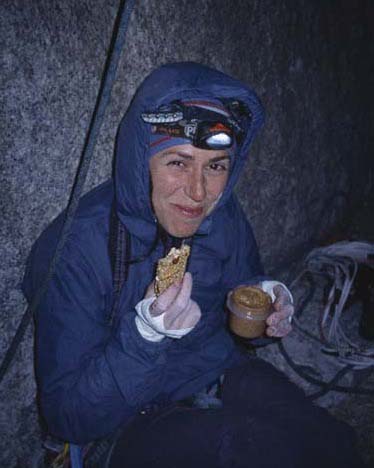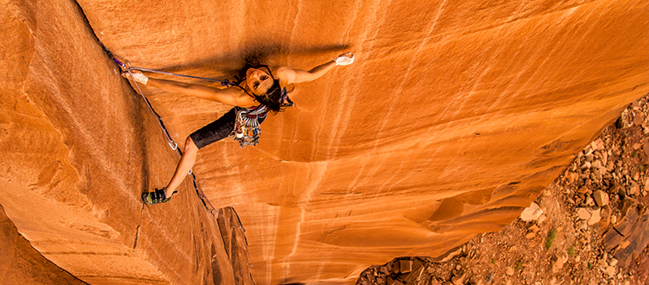Talking About Bs
- November 2007
- Training Uncategorized
Mojo Bars and almond butter: perfect fuel for freeing El Cap in a day

Steph,
First of all let me say that a lot of your climbs have been really inspiring for me. It’s a dream of mine to free climb the Salathe, and when you talk about how you really had to dedicate so much methodical training and effort to free the climb, it hit home because I’m really not a naturally talented climber at all and I have to work a lot for my harder sends.
Second: I’ve read a bunch of the stuff you said about being a vegan; I’ve been a vegetarian for four years and I’ve recently decided to stop eating dairy and eggs as well. I need some advice about how to eat like this and still be healthy enough to climb at my limit.
I read on your blog: “I like to eat lots of dark green vegetables, and I try to eat only green vegetables at night, rather than a large dinner. So usually for dinner, I will eat some steamed broccoli, or sauteed kale or chard. If I eat a “proper” full dinner, I get an upset stomach and have a hard time sleeping. I try to eat my grains and things like that, throughout the day. Along with nuts and fruit and tofu. Contrary to popular belief, I have no problem getting plenty of protein, and I perform better and am far stronger than I used to be, before I turned vegan.”
I was wondering if you also took vitamin supplements or ate fortified foods, and if not, how do you get the right amount of vitamin B12 which is only available in animal products or in vitamins or other fortified foods? One reason I ask is because I’m thinking of being a climbing bum next year after graduating from high school and probably won’t be able to afford expensive supplements.
Anyway, thanks so much for taking the time to read my message.
Sincerely,
Eric
Dear Eric,
I’m so glad you are psyched up to climb and to find the best ways to be healthy! I understand your feelings completely, because it was a long time before I understood how much effort people put into big climbing projects…..once I figured that out, it inspired me to really commit and take on bigger projects that I was excited about, both climbing and otherwise. The good news is, everyone has to work hard to do big things, so don’t be afraid to dream big and work hard towards a goal that inspires you. From what I’ve seen so far, natural talent alone is not enough to accomplish the biggest projects. Hard work and persistence are what you need to go to the next level.
To answer your question about turning vegan….the single most important thing is to eat as many whole foods as you can. Often people stop eating meat, and instead they turn to bleached out grains and sugar and watery vegetables (iceberg lettuce), and they find themselves lacking nutrition and energy. Unfortunately, those are the most readily available foods for the most part, and that’s why it happens. I have a very hard time when I am traveling or eating out, because most places just don’t have proper, normal whole foods. Fortunately, whole foods and grains make a very inexpensive and convenient diet if you are buying your own food. Brown rice, quinoa, buckwheat noodles, tofu, beans, lentils and vegetables cost a lot less than meat and cheese, or packaged foods. A lot of young, non-vegan roadtripping climbers end up subsisting on plain ramen and Coke to save money…..that is not recommended by me! Quinoa is an unbelievable super food–stores forever, cooks fast, tastes great, goes with everything, and is full of protein as well as good carbohydrates. Even if you just add Braggs liquid aminos and nutritional yeast to it, it’s so good for breakfast, lunch or dinner……
The single most important vitamin supplement for vegans, as you pointed out, is vitamin B12. You have to add B12 to your diet if you are vegan (and in fact, you’d be well advised to do it even if you are not vegan). Interestingly enough, it’s only in the last generation or so that the vegan diet does not provide B12. B12 comes from bacteria. In the olden days, there were more “good” bacteria in soil, so for example, carrots might have traces of B12 on them from the dirt they grew in. Now there is so much chemical farming that the soil has changed, and moreover, things are highly sanitized when they reach the market. So B12 no longer stays naturally on vegetables. Also, fermented foods such as sauerkraut and tempeh used to get “contaminated” with bacteria that created B12, and people would get B12 by eating those foods, which were also eaten more frequently before widespread refrigeration. Now things are much more sanitized. Since animal living conditions are not so sanitized, there are bacteria present in animal feed, and that bacteria makes it into animal flesh and dairy products, partly through ingestion and partly through contamination. Meat packers accept as inevitable a certain amount of manure in ground beef, and use a special technique to kill e coli in the meat since there is no way to keep the manure out. This is why B12 is present in animal products, but not in the vegan diet.
People retain B12 at different rates. Some people can go without it for many years, and the B12 present in their bodies is recycled and reabsorbed. Other people have B12 deficiencies almost immediately if they do not consume it. B12 builds DNA and red blood cells. It maintains the protective sheaths on nerve fibers. It converts food to energy. Without enough B12, you become anemic, fatigued, depressed, irritable, among other things, and you can eventually get heart damage. Surprisingly, over 95% of the cases of B12 deficiency do not occur in vegans, and happen because of impaired absorption (often elderly people lose their ability to absorb the B12 that is present in animal foods, and need to take vegan B12 supplements).
You can get your daily recommended intake of B12 by eating one tablespoon of nutritional yeast. This is delicious on salads, soup, stir fries, steamed vegetables, and popcorn. Yeast is also a great source of protein. I also take a multi-B supplement, just to be extra sure, which is very inexpensive. I make sure to buy the one that comes in capsules, rather than a solid pill, because it goes down easier.
Also, many foods are supplemented with B12 and the other B vitamins. Most soy and rice milks, cereals, and energy bars are fortified. Also, Emergen-C has complete daily allowances of B vitamins, as well as a lot of other great vitamins and minerals. So it’s actually pretty easy to get your B12, no matter what.
When living on the road, you’ll find that eating vegan is cheaper, easier to handle when living out of a cooler, and better for your climbing. Just don’t eat lots of white flour, rice and sugar, please!!
xx Steph








[…] Sights & Sounds from the Fifth Column – Social Issues, Politics and Improving the World wrote an interesting post today on Talking About BsHere’s a quick excerpt…foods and grains make a very inexpensive and convenient diet if you are … So it’s actually pretty easy to get your B12, no matter what. […]
[…] in the last generation or so that the vegan diet does not provide B12. …article continues at steph brought to you by diet.medtrials.info and […]
Steph, thank you for writing this! I’m slowly turning into a vegetarian, and your post gave me some good ideas to experiment with. Makes a big difference to hear an opinion of an experienced practitioner! I would love to hear some more :-).
Thanks Igor, I’m really glad if this helps at all…..drop me an email if you have any specific things you’d like to talk about. I’m always super interested in nutrition, obviously 🙂
take care and hope to hear from you,
xx Steph
Thank you! I will get on compiling the list of questions :-).
Best of luck in all your endeavors, Steph!!
[…] Talking About Bs […]
[…] Talking About Bs […]
Hi Steph!
I attended the presentation you gave in Arizona this past November. I have to say you are an inspiration as a female and a climber! I have started reading your book and I absolutely love it! It is great to know there are other women out there that have the same passions.
After hearing you talk about being a vegetarian and now vegan, and all the energy you seem to have from such a diet, I decided to try being vegetarian. I have to say I have really enjoyed it but am concerned about proper nutrition.
I was wondering if there are any books or website you recommend that I check into. I love research and feel it would be a good idea to know all I can to make sure I stay healthy.
Thank you for your help!
Dear Jen,
Two great books to look into are Becoming Vegan and Healing With Whole Foods. My favorite cookbooks are The New York Times Natural Foods Cookbook, by Jean Hewitt and From a Traditional Greek Kitchen by Aphrodite Polemis.
I hope you enjoy the research!!
take care,
xx Steph
[…] adminnHI was wondering if you also took vitamin supplements or ate bonded foods, and if not, how do you impart the precise invoke of vitamin B12 which is inner acquirable in birdlike products or in vitamins or added bonded foods? … […]
[…] Imaginary DivanHAlso, whatever foods are supplemented with B12 and the added B vitamins. Most soja and rice milks, cereals, and intensiveness exerciser are fortified. Also, Emergen-C has surpass lawful allowances of B vitamins, as substantially as a assemblage of added avid vitamins … […]